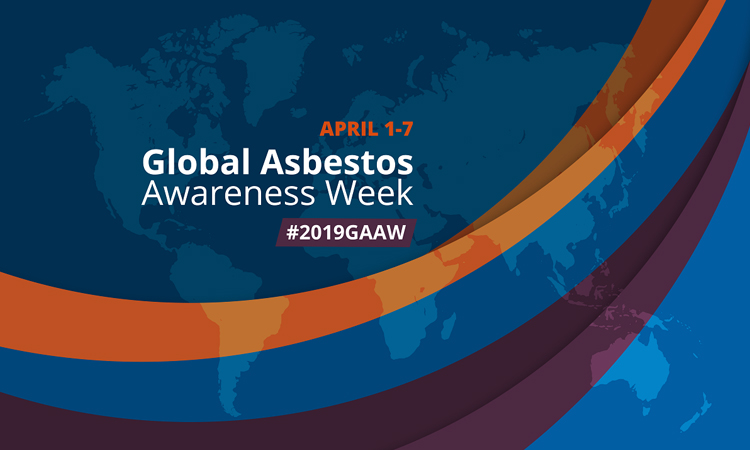
Each of the past 15 years, the first seven days of April have been designated by Congress as Global Asbestos Awareness Week (GAAW). During this time, scientists, advocates, survivors and their families come together to share knowledge and take action. For news and updates throughout the week, follow #2019GAAW.
During this important week, Simmons Hanly Conroy will be posting “7 Reasons for 7 Days,” a weeklong series profiling heroes in the asbestos prevention community. It is important to honor the men and women who have paved the way for events like GAAW and Mesothelioma Awareness Day.
Why Is Global Asbestos Awareness Week Important?
Many Americans believe that asbestos is banned in the United States. That is not true. Thanks to industry pressure, American imports of asbestos doubled in 2018 to more than 750 metric tons. Add that to the billions of tons of asbestos already present in factories, schools, and neighborhoods, and it is painfully obvious that this country still has a major asbestos problem.
Each year, thousands of people die from preventable cancers and diseases caused by asbestos. Thousands more are exposed to legacy asbestos in their homes or on a jobsite. Asbestos has been detected in baby powder, children’s toys and other consumer items. Even if asbestos is banned, the danger is far from over.
GAAW is about turning these problems into policy targets. Legislative changes can be made now to ensure that future generations are not devastated by diseases like mesothelioma, a lethal form of cancer caused exclusively by asbestos exposure.
Recognizing Asbestos Is a Global Issue in 2019
Throughout the week, the Asbestos Disease Awareness Organization (ADAO) will feature multilingual educational materials and videos because asbestos poses risks to people across the globe. The World Health Organization (WHO) estimates that 125 million people in the world are exposed to asbestos at their workplaces. Asbestos knows no boundaries.
The legality of asbestos leads to its eventual entrance into American homes thousands of miles away from where it was mined or used in manufacturing. It winds up in contaminated crayons for kids or tainted make-up for tweens, among other products.
GAAW provides an important moment to educate policymakers in other countries about the hidden risks posed by legacy asbestos and its continued use.
“When it comes to asbestos and mesothelioma, knowledge truly is power,” ADAO President and CEO Linda Reinstein said in her GAAW 2019 announcement. “This week is about empowering and equipping people to protect themselves while we work for protective legislation.”
ADAO has been working hard toward this goal. In March, The Alan Reinstein Ban Asbestos Now Act of 2019 (ARBAN) was introduced in both the House and the Senate. Named after Linda’s late husband who died of mesothelioma in 2006, the bill calls for a ban on asbestos in the United States and lays out a blueprint for an asbestos-free future.
Expect ARBAN to be a focal point during the week. Supporters of an asbestos-free future are encouraged to call their senators and representatives and urge them to support ARBAN. Though the measure proposes a commonsense path to protect the public health, past versions of the bill have stalled. That can’t be allowed to happen again – too many lives are on the line.
The 15th Annual International Asbestos Awareness and Prevention Conference
ADAO will host its Annual International Asbestos Awareness and Prevention Conference “Where Knowledge and Action Unite.” The conference takes place from April 5-7 with events in Washington D.C. and Arlington, Virginia. For a complete list of events and information about how to register, check out ADAO’s 2019 conference information.
Activities will begin on Thursday, April 4, with a public screening of Breathless at George Washington University. Breathless is a documentary that follows two men searching for answers after their parents are killed by mesothelioma. Along the way, they uncover a sickening portrait of the asbestos industry’s effort to push their carcinogenic products on developing countries.
Asbestos is everyone’s problem. There is no safe level of exposure. Until politicians reckon with the poisonous fibers that continue to be woven into the world’s infrastructure, the situation will not improve. Silence on the part of those affected is not a viable option. To that end, Friday begins with a March for Justice and Remembrance that finishes at the Capitol Building.
The show of strength and support before the nation’s lawmakers builds momentum for the vital academic conference on Saturday. Leading voices in the asbestos prevention community will speak about the progress being made. As described by ADAO, the discussion will focus on:
- Banning the mining, manufacturing and use of asbestos
- Preventing asbestos exposure through education and awareness
- Increasing compliance and enforcement of existing laws and regulations
These are the goals at the heart of ARBAN and represent the difficult steps that need to be taken in order to minimize — and ultimately eradicate — diseases caused by asbestos. The conference closes out the week on Sunday with a Remembrance and Unity Brunch.
Stay up-to-date on the action and share your story with #2019GAAW.




